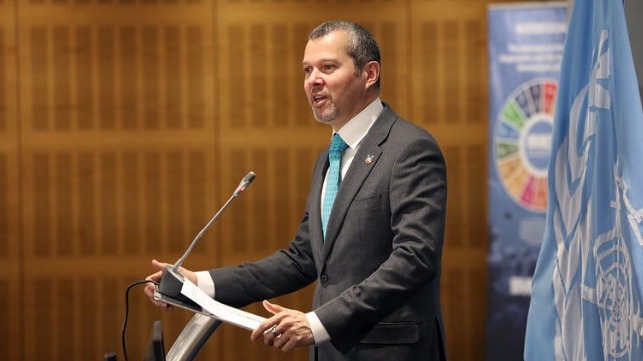IMO Secretary-General Maps Agenda Calling for Improving Shipping’s Image

A month after officially assuming the role of Secretary-General for the International Maritime Organization, Arsenio Dominguez addressed his vision for the organization as well as the challenges he sees as the priorities for the international shipping agency. He mapped out his agenda for his four-year term drawing on his 20 years of experience serving at the IMO.
Dominguez was elected to his position in July 2023 by the delegates rising from his position as head of the IMO’s Maritime Environment Protection Division. As such, he was already closely involved with one of the key issues facing the IMO, global warming, and the drive to decarbonization. As part of his agenda, he mapped out an aggressive series of steps for the IMO over the next two years saying in his update that the IMO was the first UN agency and first sector to define a global strategy to cut greenhouse gas emissions.
He is calling for “ensuring safer, more secure, and more environmentally friendly shipping,” as the pillars of his tenure leading the organization. Dominguez was first appointed in 2004 as the alternate representative of Panama to the IMO and starting in 2014 he was appointed Ambassador of Panama to the IMO. Dominguez is a naval architect and has more than 25 years of professional experience in the international maritime world.
One of the key agenda items he set for the next four years is changing public perception of the shipping industry. “One thing I am very focused on is to make this organization a more diverse, inclusive, and transparent institution,” he said outlining his agenda. He wants the IMO to be more interactive and responsive, blunting some of the criticism in the past that it is slow to move and respond to the industry.
He recognizes the importance of the role to regulate international shipping. Setting the timeline for addressing emissions he points out that in March the Marine Environmental Protection Committee will advance discussions on the medium-term efforts toward decarbonization and reducing emissions. He said the agenda includes measures for a global fuel standard and pricing mechanism as well as an interim report assessing the impact the measures will have on countries.
Dominguez said MEPC would move quickly to finalize the impact assessment by the fall and approve measures in the spring of 2025. He expects the adoption of the measures six months after their approval, which would be in the fall of 2025.
This goes with his second agenda point of supporting member nations. He wants the IMO to become more supportive, especially of small island developing states and the least developed countries. These are many of the same states that pushed for the most aggressive measures during the prior rounds of MEPC citing the impact global warming was having on their countries.
The Secretary-General stressed his commitment to encouraging a culture of transparency, diversity, and inclusion in the work of the IMO. This goes with his agenda item to improve relations with people and stakeholders.
At the same time, he recognized that there are challenging issues to which the IMO must respond. He condemned the attacks by the Houthi on Red Sea shipping while calling for the de-escalation of tensions and freedom of navigation. He stressed the importance of the Suez Canal to global shipping citing UN Conference Trade and Development (UNCTAD) data that shipping in the region is down 42 percent in the last two months. Furthermore, he said the IMO is “actively dialoguing with countries, industry partners, and the international community to find solutions.”

that matters most
Get the latest maritime news delivered to your inbox daily.
He cited other key challenges for the shipping industry where he believes the IMO must take an active role. He pointed to the acceleration of digitalization in shipping, the issues of regulating and shaping the commercial use of autonomous shipping, and the urgent need for maritime education to get more people involved in seafarer careers.
Dominguez said he would use this experience as a former delegate as well as experience with the main IMO governing bodies to support the IMO and its decision-making process. He recognizes that IMO and industry face many challenges saying he would make the IMO more responsive and open as it moves forward.
